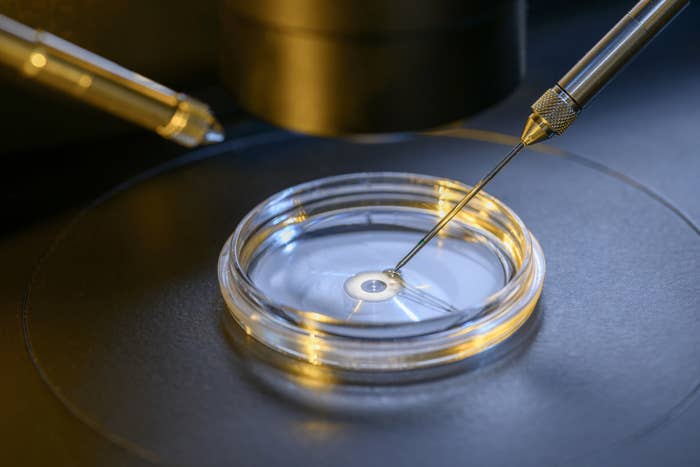
A university has been granted permission to perform mitochondrial donation IVF techniques, commonly known as "three-parent" or "three-person babies".
The Human Fertilisation and Embryology Authority (HFEA) has given the licence to researchers at Newcastle University. It means the first babies born using the technique could arrive early 2018, or even very late this year.
Most cells of the human body contain thousands of mitochondria, tiny objects that generate energy for our bodies and are passed down from from mother to child. They are descended from bacteria and contain their own DNA; when this DNA mutates and goes wrong, it can cause debilitating diseases.
Mitochondrial donation involves taking the nucleus and DNA out of the egg of a woman with mitochondrial disease and implanting it in a new egg with healthy mitochondria. That new egg will then be fertilised and implanted using normal in-vitro fertilisation, or IVF, techniques.
Parliament voted in 2015 to make mitochondrial donation legal, pending HFEA approval, and last year the HFEA approved its use in licensed cases. This is the first time such a licence has been granted.
Mitochondrial disease is relatively rare, affecting perhaps 3,500 women in Britain. But because mitochondria are only passed down from mothers, it can be impossible for women with the condition to have healthy children.
Liz Curtis, founder of the Lily Foundation and mother of a daughter, Lily, who died at 8 months of mitochondrial disease, told BuzzFeed News last year that the condition is "cruel". “Watching your child die, knowing there’s no cure and nothing you can do, it’s cruel," she said. "And knowing you carry the gene that will more than likely be passed on to other future children, it’s a double blow.”
Professor Doug Turnbull, the head of Newcastle's Wellcome Centre for Mitochondrial Research, told the Science Media Centre that he was "delighted" by the decision. “This will allow women with mitochondria DNA mutations the opportunity for more reproductive choice," he said. "Mitochondria diseases can be devastating for families affected and this is a momentous day for patients who have tirelessly campaigned for this decision."
Jeremy Farrar, the director of the bioscience charity the Wellcome Trust, said in a statement that "this is a landmark day for people living with mitochondrial disease".
He added that while it was right that the process of regulating the procedure was thorough, it was also important to recognise "that for some affected families this decision may have come too late".
